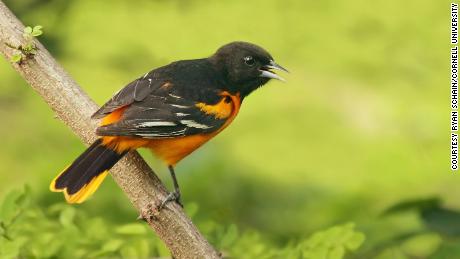(CNN)Complex societies were thought to only exist among mammals, including humans, other primates, elephants, giraffes and dolphins.
But a new study shows that vulturine guinea fowl, a bird with distinctive blue plumage that lives in Africa, can keep track of relationships with hundreds of others -- challenging the prevailing view that big brains are a requirement for complex society.
While many birds live in groups, these birds behave "highly cohesively" and don't display any aggression between groups.
"To our knowledge, this is the first time a social structure like this has been described for birds," said Danai Papageorgiou, lead author of the paper published Monday in Current Biology and a PhD student at the Max Planck Institute of Animal Behavior in Germany.
"It is remarkable to observe hundreds of birds coming out of a roost and splitting up perfectly into completely stable groups every single day."
The study, which is the first conducted on the species, involved tracking social relationships in a population of more than 400 adult birds in Kenya for 12 months. Tracking the vulturine guinea fowl took place at the Mpala Research Centre and Wildlife Foundation in Laikipia District, central Kenya. The researchers individually marked all birds in the population. By observing them they discovered that the population comprised 18 distinct social groups, with 13 to 65 birds in each group.
The researchers witnessed the birds walking very long distances -- up to 15 kilometers a day --- remaining within a few meters of everyone else and when conditions were very dry, all the groups in a roost sometimes walked a kilometer to the nearest river together to drink.
"An impressive sight is watching 300 birds all walking together through the landscape," said Damien Farine, senior author on the paper and a principal investigator at the Max Planck Institute of Animal Behavior and the Centre for the Advanced Study of Collective Behaviour at the University of Konstanz in Germany.
Like other species, Farine said that the vulturine guinea fowl survival was heavily reliant on living in groups. "They are large and colorful, making them very obvious to the many predators that live in their environment ... and they rely on each other to spot these predators before they can attack and kill them.
"However, clearly vulturine guinea fowl have made more of group life than many other animals -- and our study is the first step to trying to discover why they express such complex social behaviors."
Social network
Complex societies occur when individuals repeatedly interact with the same individuals across a range of different contexts, and have different types of relationships with different individuals. These usually require animals to live in quite large and quite stable social groups, said Farine.
Because this requires the animals to keep track of individuals in both their own and other groups, the assumption has long been that multilevel societies should only exist in species with the intelligence to cope with this complexity.
"This discovery raises a lot of questions about the mechanisms underlying complex societies and has opened up exciting possibilities of exploring what is it about this bird that has made them evolve a social system that is in many ways more comparable to a primate than to other birds," said Farine.
While many bird species live in groups, these are either open, lacking long-term stability, or highly territorial, lacking associations with other groups, the scientists said.
The groups of guinea fowl associated with each other based on preference, rather than random encounters, and these groups remained stable, the researchers found.
"The birds definitely encounter and interact with hundreds of other individuals over a period of weeks to months," said Farine.
"However, they might not need to know exactly who each individual is -- and it is an open question just how much they know about other individuals that they encounter regularly."
However, he said there is increasing evidence that animals have relationships that could be considered as being similar to friendships.
"In my opinion, we have a lot to learn about why we have 'friends' by studying social relationships in animals. There is increasing evidence that there are many functional reasons for us to have friends (e.g., they make us feel better by reducing stress), and animals are likely to gain similar benefits," he said in an email.
GPS tags
To see how all 18 groups of vulturine guinea fowl interacted, the researchers attached GPS tags to a number of birds in each group.
The researchers also found that intergroup encounters were more likely to take place during specific seasons and around particular physical features in the landscape.
For example, when it was dry, groups of guinea fowl moved toward the river, a dangerous location for the birds because it also attracts predators, such as lions, cheetahs, leopards and eagles.
"To make it safer, groups join and move there together. When conditions are wetter, the groups aggregate together on large grassy areas, known as glades. This is where the richest resources are, and again being in large groups allows them to extract resources more efficiently, with many eyes looking out for predators," Farine said.
"Because we could track where and when every group moved, we could construct a complete picture of all the encounters between all of the groups in our study population. This is very unique," he added.








